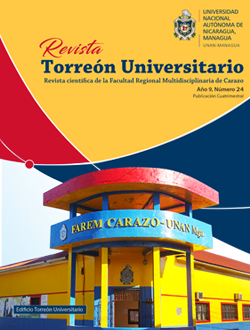What is the Fund for Research Projects (FPI) at UNAN-Managua?
DOI:
https://doi.org/10.5377/torreon.v9i24.9718Keywords:
fund for research projects, research, UNAN-ManaguaAbstract
Nicaraguan Higher Education Institutions have as one of their essential objectives to develop and promote scientific research as a fundamental strategy to contribute to the transformation of society. This article describes the role of the Fund for Research Projects (FPI) of the Universidad Nacional Autónoma de Nicaragua, Managua (UNAN-Managua) in promoting and increasing research at the University. The population under study was composed of the applied and awarded projects in the four calls (2015-2017, 2016-2018, 2017-2019 and 2018-2020). Out of 233 projects received, 127 were financed, of which 66 projects were in the research area of climate change, environmental management, and natural resource management. The modality with the highest number of funded projects was that of Teacher-Researchers. The main limitations have been the delay in financial returns, acquisition of inputs and the delay in delivery of products. However, the FPI has become an important instrument for promoting research at UNAN-Managua, following the agreement with the compromises included in the National Human Development Plan and the Sustainable Development Goals.
Downloads
Downloads
Published
Issue
Section
License
The authors who publish in this journal agree to the following terms.
- The author or authors of the articles, essays or research grant the National Autonomous University of Nicaragua, Managua (UNAN-Managua) the editing rights (copyright) of the submitted work, therefore the University has the exclusive right to publish the article for the entire copyright period.
- These copyrights/authors authorize Torreón Universitario Magazine and the University to edit and disseminate/publish the article in said Magazine, including printed and electronic reproduction, storage, retrieval and any other type of publication, and sources of secondary information as services. of summaries and databases, they also empower it to protect the article against unauthorized use for dissemination by printed or electronic media (PDF, HTML, EPUB, XML or others).
License for use of content
The magazine uses the Creative Commons Attribution-NonCommercial-NoDerivs 4.0 International License.
Under this statement:

This journal is licensed under a Creative Commons Attribution-NonCommercial-NoDerivatives 4.0 International License. It can be copied, distributed and transmitted publicly as long as the author and source are cited (Revista Torreón Universitario), it should not be modified or used for any commercial purpose. The full license can be found at http://creativecommons.org/licenses/by-nc-nd/4.0/.



